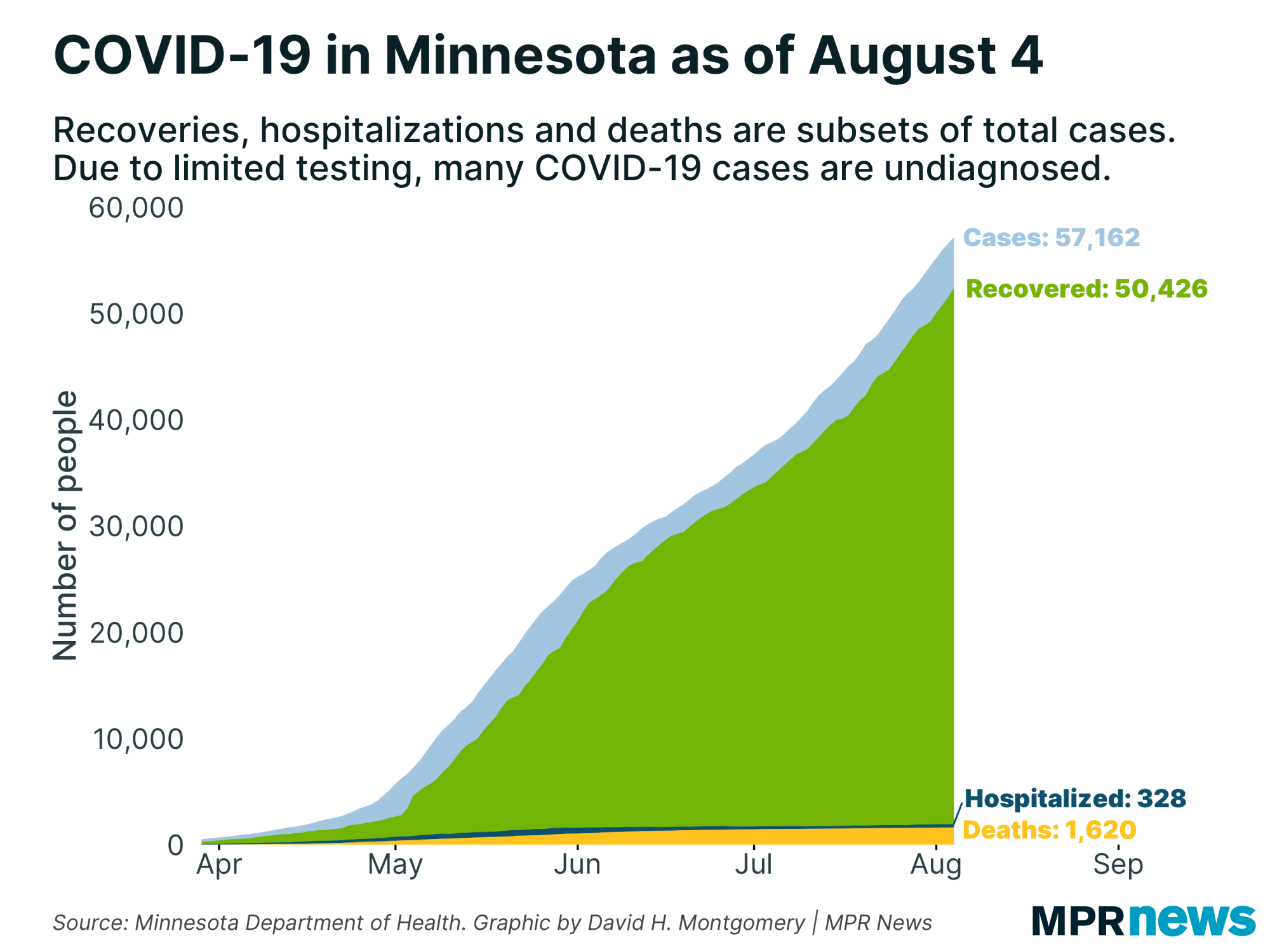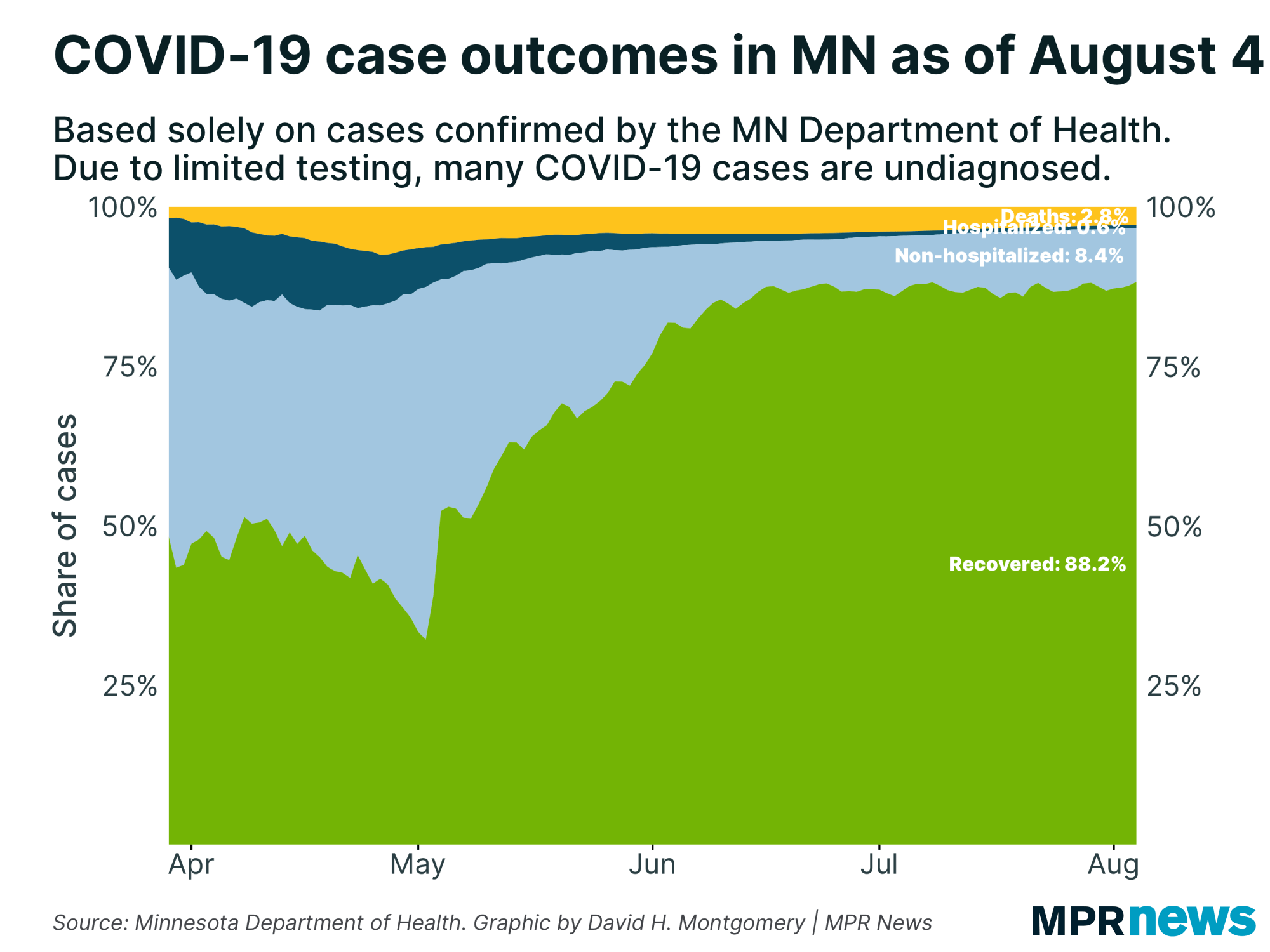April 13 update on COVID-19 in MN: Walz ties reopening economy to massive jump in testing

Go Deeper.
Create an account or log in to save stories.
Like this?
Thanks for liking this story! We have added it to a list of your favorite stories.
Updated 5:33 p.m. | Posted: 5 a.m.
Gov. Tim Walz on Monday signaled the state planned to move into a more aggressive posture to test for COVID-19 and trace and isolate those infected as part of the next phase of reopening parts of the economy.
Minnesota has tested just under 40,000 Minnesotans since the pandemic began but “we need to be testing 40,000 a week or more,” Walz told reporters during an afternoon briefing.
The governor tempered his ongoing warnings about an expected surge in cases and frustration over securing laboratory supplies and testing gear with guarded optimism the state’s health system would be ready to handle the load and that economically “there are plans to move us back to a more sustainable place.”
He also said he supported allowing bars to sell beer and wine for off-site consumption and would sign a bill once the Legislature approves it.
Turn Up Your Support
MPR News helps you turn down the noise and build shared understanding. Turn up your support for this public resource and keep trusted journalism accessible to all.
Walz said his people were also working on guidance about outdoor activities, including golf and fishing, and that he hoped for an answer soon. "The more we're able to open some of these things it will let off a little bit of steam."
Walz’s remarks came hours after state health officials reported no new deaths in Minnesota tied to the COVID-19 pandemic compared to Sunday. That means the death toll remains at 70. The number of people in intensive care also remained stable from Sunday at 74.

The Health Department reported 1,650 people testing positive for COVID-19 since the outbreak began, with just over half recovered to the point they no longer need to be isolated.
While he didn’t have details, Walz made it clear that the state was preparing a “big push” on testing as part of the effort to restart the economy, which has been hit hard the past month.
He cautioned that it was too early to decide if his stay-at-home order will go beyond May 4 and that he could not set a date yet for when restaurants and bars — businesses hurt badly by the virus and the stay-at-home order intended to slow its spread — but that he said he envisioned a “rolling back into the economy” as testing efforts jump.
Among the other updates Monday:
Walz and state officials said the state’s executive branch would put a hiring freeze in place for jobs not directly related to COVID-19 and that the governor and his commissioners would take a 10 percent pay cut through the rest of the year.
The Metro Mobility transportation service in the Twin Cities region would begin offering health care workers free door-to-door transportation to and from work, 24 hours a day.
Health Commissioner Jan Malcolm said data that was provided over the weekend on COVID-19 cases, hospitalizations and deaths did not offer an "apples to apples" comparison of changes from prior days. The current totals have been updated.
The disease continues its spread into rural parts of Minnesota. Red Lake, Todd and Rock counties reported their first confirmed coronavirus cases Sunday, although the Health Department reported no new counties on Monday.

Officials continue to caution the virus is much more widespread than what the daily updates indicate, with yet-undiscovered cases potentially higher than 150,000.
Walz on Monday also extended his “peacetime emergency” order for another 30 days, through May 13. Walz invoked the peacetime emergency on March 13, allowing him to take executive actions to deal with the coronavirus.
The order extension drew a rebuke from some House Republicans, who say they’ll try to overturn it this week in the Legislature.
Developments from around the state
Cleveland-Cliffs to idle northern MN mine over pandemic market shock
Cleveland-Cliffs Inc. said Monday it plans to temporarily idle Northshore Mining in northeastern Minnesota. The company plans to temporarily idle production at Northshore by mid-April with a planned restarted by August.
Cliffs said it will work down current inventory levels from the mine and continue to ship iron ore to fulfill its agreements with steel customers.
In a statement, CEO Lourenco Goncalves said the Cleveland-based company has evaluated market conditions “and the extraordinary disruptions in manufacturing and steel production in North America due to the impact of the COVID-19 market shock.”
Northshore Mining officials said about 470 employees will be laid off, with the remaining 100 employees kept on to maintain the yard and dock crews to load vessels, KBJR-TV reported. The company will also idle Tilden Mine in Michigan by the end of April, with a planned restart in July.
— The Associated Press
Inmates at Hennepin Co. jail, Willow River prison test positive for COVID-19
The Hennepin County Sheriff's Office says the jail has detected its first confirmed case of COVID-19.
In a news release, sheriff's office spokesperson Rob Allen said a man exhibiting symptoms of the virus was booked into the jail last Friday. The man was tested and isolated pending the results of the test. Allen said after the man tested positive, he was notified about his status and was released to isolate at home.
Allen said the jail had already implemented safety precautions to prevent an outbreak including suspending visits, training jail staff on sanitation and the use of personal protective gear and isolating symptomatic inmates or those who may have been exposed to the virus.
The state Department of Corrections said on Monday an inmate at the Willow River correctional facility has also tested positive for the coronavirus.
As of Sunday, 11 inmates at the Moose Lake prison have tested positive. Moose Lake had the first confirmed cases of the coronavirus in a Minnesota adult prison. Corrections Commissioner Paul Schnell has said the release of some state prisoners because of the coronavirus could happen as early as this week.
— Brandt Williams | MPR News and The Associated Press
First responders to see confirmed COVID-19 addresses
Gov. Tim Walz on Friday signed an executive order directing the state Department of Health to develop a protocol for sharing information about confirmed COVID-19 cases with first responders.
Walz's order allows for the addresses where a COVID-19 case has been identified — and only where a patient is still contagious — to be disclosed to 911 dispatchers and first responders. Names of affected individuals and other identifying information will not be provided to local officials.
Walz wrote in his order that first responders need to assume everyone they meet could be a coronavirus carrier — but the order allows for more protection.
"This decision is not taken lightly," Walz wrote in the order. "We must ensure that this health information is disclosed only to those who have an emergent need to know it, and we must implement safeguards to ensure that no one abuses this data. Minnesota has a strong tradition of protecting the private data of its citizens. This is reflected in the penalties imposed for unlawful use of private data provided by the (Minnesota Government Data Practices Act), which will continue to apply to the data shared under this Executive Order."
The order mandates that "the shared data must remain confidential, be encrypted in transit, (and be) provided only to the minimum number of people necessary."
Minnesota U.S. Rep. Pete Stauber of Minnesota's 8th District, a retired police officer, was among those who had backed such an order.
"As we continue to wage war against COVID-19, it is only right that the law enforcement officers, first responders, and firefighters on the front lines of this fight have all the information they need to protect and prepare themselves," he said in a news release.
— MPR News staff
Minnesota DNR closes Grand Portage State Park
The Minnesota Department of Natural Resources has temporarily closed Grand Portage State Park in far northeastern Minnesota.
That's at the request of the Grand Portage Band of Lake Superior Chippewa, amid concerns about the spread of the coronavirus pandemic. The park is located on the Grand Portage Reservation.
The closure is in effect until at least May 4.
Meanwhile much of Fort Snelling State Park in the Twin Cities is closed due to flooding along the Minnesota and Mississippi rivers.
Other state parks remain open for day use, but state park campgrounds, lodging and visitor centers are closed because of COVID-19.
— MPR News staff
Top headlines
Minnesota farmers to feel fallout from closure of major pork processing plant: For Minnesota, one of the biggest pork-producing states in the country, the plant plays a significant role in hog farms' sales. “It would be pure speculation as to what the price impact for farmers is going to be starting this coming week, but I see zero scenario that it’s not negative. It’s just a question of how much,” said David Preisler, CEO of the Minnesota Pork Producers Association.
Legislature to act on new coronavirus bill with others in works: The Legislature has already passed three bills with financial help for health providers, first responders and small businesses. The latest plan is more policy focused.
Local government goes virtual during pandemic: The coronavirus pandemic, and efforts to slow its spread, has shuttered many government buildings. But cities and counties need to continue providing essential services, so many local governments are moving to remote, virtual meetings.
Minneapolis officials say too many are ignoring posted virus signs: City officials may get tougher on people who ignore social distancing rules. However, Minneapolis police are not eager to issue fines.
COVID-19 in Minnesota
Health officials for weeks have been increasingly raising the alarm over the spread of the novel coronavirus in the United States. The disease is transmitted through respiratory droplets, coughs and sneezes, similar to the way the flu can spread.
Government and medical leaders are urging people to wash their hands frequently and well, refrain from touching their faces, cover their coughs, disinfect surfaces and avoid large crowds, all in an effort to curb the virus’ rapid spread.
The state of Minnesota has temporarily closed schools, while administrators work to determine next steps, and is requiring a temporary closure of all in-person dining at restaurants, bars and coffee shops, as well as theaters, gyms, yoga studios and other spaces in which people congregate in close proximity.


